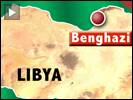
Topics
Guests
- Elizabeth TanDeputy Regional Representative of the United Nations High Commissioner for Refugees, based in Cairo, Egypt.
Reports have emerged of a dire situation on Libya’s borders with Tunisia and Egypt, where tens of thousands have fled to evade the clashes. We speak to Elizabeth Tan of the Office of the United Nations High Commissioner for Refugees. [includes rush transcript]
Transcript
AMY GOODMAN: Professor Campbell, we’re also joined by Elizabeth Tan, deputy regional representative for UNHCR in Cairo, Egypt, the United Nations High Commission for Refugees. The refugee crisis is getting more intense every day, Elizabeth Tan, both on the Tunisian-Libya border and on the Egyptian-Libya border. Can you talk about what is happening now?
ELIZABETH TAN: Yes. The crisis is indeed getting worse by the day in Tunisia. There are thousands and thousands of people stranded there at the border who are trying to get back to their homes. Many of them are from Egypt. There are efforts underway to go and to repatriate them, but the border is extremely congested, and UNHCR is very concerned about the humanitarian situation there. We are, together with the International Organization for Migration, trying to mount an air operation to bring people back to Egypt. There are, of course, a lot of other persons stranded at the border both here in Egypt and even more in Tunisia, people who are desperate to get home, to get away from the situation at the border there, thousands and thousands of people stuck who want to go home.
AMY GOODMAN: How can they best be helped?
ELIZABETH TAN: I think for the — certainly, there is a need to decongest the area around the border in Tunisia. In Egypt, I would say that there is — that the situation is better. There are less people there. And most of the people crossing are Egyptian, so they are directly going to their homes. In Tunisia, UNHCR is providing shelter, and agencies are providing food and trying to set up sanitation facilities there, but I think the main need is really to provide transportation for people to get home.
AMY GOODMAN: And food? How are people getting access to food? And what about word that Muammar Gaddafi’s forces are now moving into the border areas, where people have been able to go freely back and forth until now?
ELIZABETH TAN: I think certainly there are a lot of humanitarian agencies, and the governments of both Egypt and Tunisia are helping the people who are at the borders. In terms of — I am based in Cairo. So, there are no problems of people accessing the border, with the exception of people — refugees and persons of — from sub-Saharan Africa who are stuck in their homes, who are very afraid to move, as the other speaker on your program was mentioning. UNHCR is very concerned about those people. But on the eastern side, otherwise, the access to the border is OK.
AMY GOODMAN: Elizabeth Tan, I want to thank you for being with us, deputy regional representative for the U.N. High Commission on Refugees. She’s speaking to us from Cairo, Egypt.












Media Options